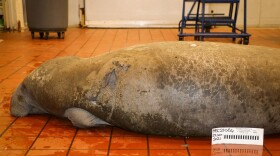-
Mosaic said the lawsuit by the Center for Biological Diversity should be dismissed because it already finished building parts of the road that included phosphogypsum.
-
Mosaic Fertilizer told a federal appeals court a legal battle should end because the company has completed parts of a Polk County road project that includes a radioactive byproduct of the phosphate industry.
-
The bill would create a new legal shield for people who own former phosphate mining land. It helps owners remove what's called “strict liability” if someone sues over harms caused by pollution.
-
If permits are approved, construction at the Riverview plant would begin in 2028, according to a preliminary company presentation.
-
The EPA approved the pilot project. Attorneys for the agency and Mosaic say the EPA had discretion to sign off on it.
-
Fertilizers fuel algae blooms in springs and other waterways. That's why some counties ban their sale during rainy months. But one county is considering revising its summertime and wintertime-ban
-
Lakeland approves $268,000 plan to reduce lake’s phosphorus, increase clarity.
-
Rampant pollution caused manatees to starve. Florida waters are getting worse.
-
Federal regulators are seeking comment on their plan to approve the test road bed project in Polk County through Nov. 8.
-
The phosphate mining company had halted operations across Florida to prevent potential damage from Milton.
-
There are concerns Hurricane Milton could impact phosphogypsum plants in the state. A leak in 2021 resulted in the release of around 215 million gallons of polluted water into Tampa Bay.
-
Critics say placing the phosphate waste in roadways could put human and environmental health at risk.
Play Live Radio
Next Up:
0:00
0:00
Available On Air Stations












